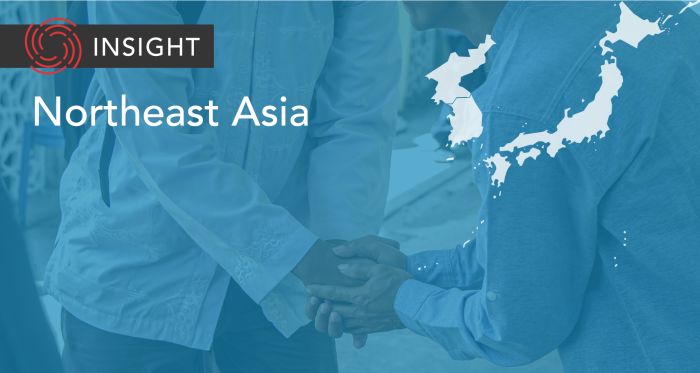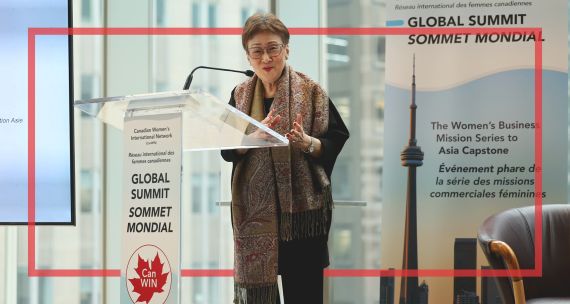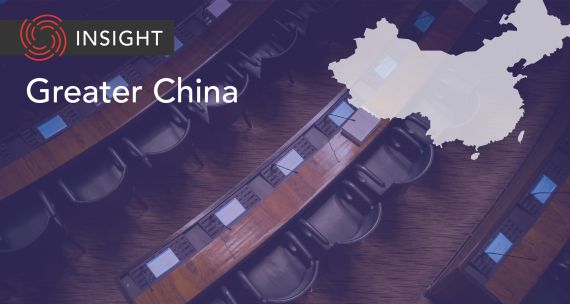The Takeaway
In keeping with his campaign pledge to build a “future-oriented partnership” with Japan and re-engage the country through “shuttle diplomacy,” or regular mutual visits, South Korean President Yoon Suk Yeol met with Japanese Prime Minister Kishida Fumio for their second summit meeting on May 7. Despite numerous unresolved irritants between the two countries, the dramatic shift in bilateral relations could open new doors for engagement, including with Canada.
In Brief
After a series of high-level meetings between political and defence officials following Yoon’s election in 2022, Yoon and Kishida agreed to resume reciprocal visits and security dialogues, address trade disputes, and reinstate an intelligence-sharing agreement. On March 16 in Tokyo, Japan and South Korea held their first bilateral leader-level summit in 12 years. The meeting marked a significant rebound: bilateral relations, deteriorating throughout the 2010s, reached a low point in 2018 over a South Korean court case, which led to a diplomatic row and trade tensions.
Following the March 16 summit, South Korea retracted its complaint against Japan’s export curbs filed with the World Trade Organization, while Japan committed to lifting its export restriction on critical semiconductor materials. The two countries also re-established a working relationship between Statistics Korea and the Statistics Bureau of Japan to collect, analyze, and share data for both countries. Following the resumption of joint meetings, senior diplomats and defence officials discussed North Korea, growing nuclear and missile threats, and more during “2+2” talks. The two leaders met again during Kishida's first bilateral visit to Seoul on May 7, marking the full-scale resumption of "shuttle diplomacy," or regular mutual visits, as agreed upon by Yoon and Kishida in March. While the summit drew mixed reactions in both countries, various issues were discussed, such as the planned release of treated water from the Fukushima nuclear power plant, security, high-tech industries, science and technology, and co-operation on youth and cultural affairs. Overall, the summits proved to be critical opportunities for discussions on strengthening and expanding security and economic ties, signalling a possible reshaping of Northeast Asian international dynamics.
Implications
Since Yoon’s controversial proposal to compensate forced labour victims through a foundation funded by South Korean firms in March, both sides have extended olive branches. Most recently, in a goodwill gesture during the summit, Kishida agreed to allow South Korean experts to conduct an on-site inspection of the now-defunct Fukushima nuclear power plant ahead of the planned release of treated water into the Pacific Ocean.
South Korea has long expressed concerns about the release of treated water into the ocean from Fukushima. On January 30, South Korean newspapers reported that millions of tonnes of treated water from Fukushima — stored as ballast water on cargo ships — were dumped into South Korean waters from mid-2017 to the end of 2022, resulting in small-scale protests across the country.
On March 20, Kishida invited Yoon to attend the Group of Seven (G7) summit in Hiroshima from May 19 to 21. The two leaders are expected to hold bilateral talks as well as a trilateral meeting with U.S. President Joe Biden, which will likely focus on bolstering security ties in response to the North Korean nuclear and missile threats.
On April 24, the South Korean Ministry of Trade, Industry and Energy revised its list of trusted “strategic” trading partners, restoring Japan’s fast-track status after a three-year absence. South Korea does not feature on Japan's “whitelist.” That could change soon, however: Japan's Ministry of Economy, Trade and Industry is currently canvassing the public on possible revisions to its own export control rules. Cabinet approval would also be required for such a change.
While the two countries didn’t ink any agreements on semiconductors or batteries, Kishida and Yoon are exploring ways to enhance economic co-operation and supply chain management to strengthen partnerships in sectors such as energy and minerals. This thawing of bilateral tensions and continual relaxing of pandemic travel restrictions will help increase subnational and people-to-people exchanges.
What's Next
- Projects for future-oriented relationship
On May 11, the Japan Business Federation (Keidanren), Japan’s biggest business lobby, announced that it has completed procedures to establish a fund for projects aimed at building a future-oriented relationship between Japan and South Korea. Keidanren, alongside its South Korean counterpart, the Federation of Korean Industries, will jointly host a forum on industry co-operation in Seoul on July 6.
- On Canada’s Indo-Pacific Strategy
Prime Minister Justin Trudeau is set to visit Seoul between May 16 and 18 to meet with Yoon to exchange views on economic and energy security, net-zero emissions, and human rights, before attending the G7 summit in Hiroshima from May 19 to 21.
- A new alliance?
In January 2023, Canada proposed a new alliance with Japan, South Korea, and the U.S., aimed at countering China's growing influence in the Indo-Pacific region. The proposal aligns with Canada's Indo-Pacific Strategy, by emphasizing the need to promote “peace, resilience, and security,” but it remains to be seen if the proposal will advance at the Seoul summit or subsequent G7 meetings.
• Produced by CAST's Northeast Asia team: Dr. Scott Harrison (Senior Program Manager); Momo Sakudo (Analyst); Tae Yeon Eom (Analyst); and Sue Jeong (Analyst).




